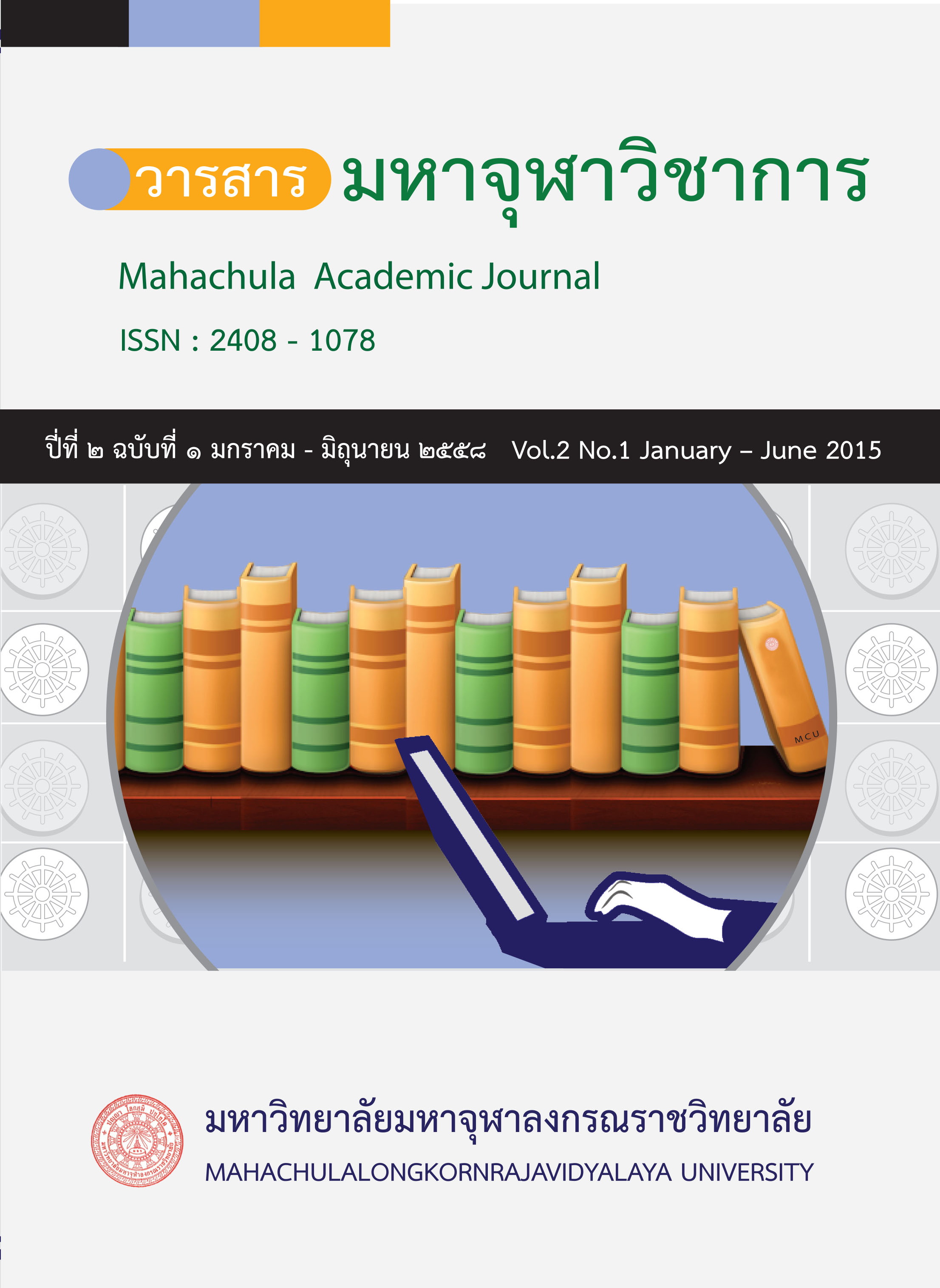The Pandita according to the Buddhist Methods
Main Article Content
Abstract
Panditas in the worldly sense mean the knowledgeable people, the savant, the man of learning and the 3 graduates :- the bachelor degree, the master degree and the doctorate degree. The Panditas in Buddhist University are of 3 objectives :- 1) to have the omniscience and the experience about the history of Buddhism and the analysis, the criticizes and the researches about proficient Buddhism. 2) to have the virtuous and the moral, the Societies” Leader of the intellect and the mind. 3) to apply the propagation of Buddha Dhammas for developing the life and the societies. In the Buddhist Methods in the education for degrees, there are the educations called Ti Sikkhàs, which mean the clauses for studying and the precepts which are the principles for study. There are the practices for the higher body, speech, mind, and the intelligence to reach the enlightenment.
Buddhism emphasized the important Ti Sikkhàs, because of the Dharmas practices in all Buddhism principles including the Ti Sikkhàs. It is the Doctrine covering all the Buddhist principles. Then, we can say Buddhism is of the Doctrines of Education. The receiving of the Deegrees to be the Panditas according the Buddhist Methods is the Buddhist Education.
Article Details
References
พุทธทาสภิกขุ. การศึกษาและการรับปริญญาในพระพุทธศาสนา. กรุงเทพมหานคร : หจก. ภาพพิมพ์, ๒๕๒๗.
พระธรรมกิตติวงศ์ (ทองดี สุรเตโช). พจนานุกรมเพื่อการศึกษาพุทธศาสตร์ “คำวัด”. พิมพ์ครั้งที่ ๓. กรุงเทพมหานคร : ธรรมสภาและสถาบันบันลือธรรม, ๒๕๕๑.
พระธรรมปิฎก (ป.อ.ปยุตโต). พจนานุกรมพุทธศาสตร์ ฉบับประมวลธรรม. พิมพ์ครั้งที่ ๙. กรุงเทพมหานคร : โรงพิมพ์มหาจุฬาลงกรณราชวิทยาลัย, ๒๕๔๓.
พระธรรมปิฎก (ป.อ.ปยุตโต). พจนานุกรมพุทธศาสน์ ฉบับประมวลศัพท์. พิมพ์ครั้งที่ ๙.กรุงเทพมหานคร : โรงพิมพ์มหาจุฬาลงกรณราชวิทยาลัย, ๒๕๔๓.
พระพรหมคุณาภรณ์. (ป.อ.ปยุตฺโต). พุทธธรรม (ฉบับขยายความ). พิมพ์ครั้งที่ ๑๒. กรุงเทพมหานคร : โรงพิมพ์มหาจุฬาลงกรณราชวิทยาลัย, ๒๕๕๑.
พระพรหมคุณาภรณ์. (ป.อ.ปยุตฺโต). สามไตร. พิมพ์ครั้งที่ ๓. กรุงเทพมหานคร : บริษัท พิมพ์สวย จำกัด, ๒๕๕๐.
พระพรหมคุณาภรณ์. (ป.อ.ปยุตฺโต). หลักสูตรอารยชน. กรุงเทพมหานคร : เจริญดีมั่นคงการพิมพ์, ๒๕๕๖.
พระมหาสมจินต์ สมฺมาปญฺโญ ผศ.ดร. (วันจันทร์). “ทัศนะเกี่ยวกับการศึกษาของพระธรรมปิฎก (ป.อ.ปยุตฺโต) : วิเคราะห์จากหนังสือ “ทางสายกลางของการศึกษาไทย”. บทความวิชาการ มจร., ๒๕๔๖.
พระมหาสมปอง มุทิโต. คัมภีร์อภิธานวรรณนา. พิมพ์ครั้งที่ ๒. กรุงเทพมหานคร : บริษัท ประยูรวงศ์พริ้นติ้ง จำกัด, ๒๕๔๗.
มหาวิทยาลัยมหาจุฬาลงกรณราชวิทยาลัย. พระไตรปิฎกภาษาไทย ฉบับมหาจุฬาลงกรณราชวิทยาลัย เล่มที่ ๑๒, ๒๐, ๒๕. กรุงเทพมหานคร : โรงพิมพ์มหาจุฬาลงกรณราชวิทยาลัย, ๒๕๓๙.
ราชบัณฑิตยสถาน. พจนานุกรม ฉบับราชบัณฑิตยสถาน พ.ศ. ๒๕๕๔. พิมพ์ครั้งที่ ๒. กรุงเทพมหานคร : บริษัท นานมีบุคส์พับลิเคชั่นส์ จำกัด, ๒๕๕๖.
[ออนไลน์], แหล่งที่มา : http://www.mcu.ac.th/ [๑๐ มีนาคม ๒๕๕๘].


